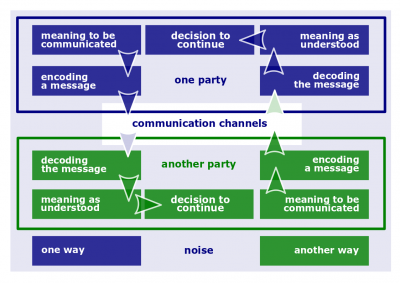Difference between revisions of "Communication process"
MariamKhalid (talk | contribs) |
|||
| (One intermediate revision by one other user not shown) | |||
| Line 4: | Line 4: | ||
According to [[Organizational Behavior by Robbins and Judge (17th edition)]], | According to [[Organizational Behavior by Robbins and Judge (17th edition)]], | ||
:[[Communication process]]. The steps between a source and a receiver that results in the transfer and understanding of meaning. | :[[Communication process]]. The steps between a source and a receiver that results in the transfer and understanding of meaning. | ||
| + | According to [[Management by Robbins and Coulter (14th edition)]], | ||
| + | :[[Communication process]]. The seven elements involved in transfering meaning from one person to another. | ||
| + | |||
==Key concepts== | ==Key concepts== | ||
| Line 11: | Line 14: | ||
*[[Noise]]. Any disturbances that interfere with the transmission, receipt, or feedback of a message. | *[[Noise]]. Any disturbances that interfere with the transmission, receipt, or feedback of a message. | ||
| − | ==Related | + | ==Related lectures== |
*[[Communication Quarter]]. | *[[Communication Quarter]]. | ||
| − | [[Category: Septem Artes Administrativi]][[Category: Articles]] | + | [[Category:Management]][[Category: Septem Artes Administrativi]][[Category: Articles]] |
Latest revision as of 08:18, 3 June 2020
Communication process (hereinafter, the Process) is the steps between a data source and a data receiver that results in the transfer and understanding of meaning. In other words, communication process is a set of activities involved in transferring meaning from one person to another.
Definitions
According to Organizational Behavior by Robbins and Judge (17th edition),
- Communication process. The steps between a source and a receiver that results in the transfer and understanding of meaning.
According to Management by Robbins and Coulter (14th edition),
- Communication process. The seven elements involved in transfering meaning from one person to another.
Key concepts
- Message. A purpose to be conveyed.
- Encoding. Converting a message into symbols.
- Decoding. Retranslating a sender's message.
- Noise. Any disturbances that interfere with the transmission, receipt, or feedback of a message.
